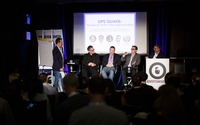Agencies Won't Survive Without A 'Flatter' Operating Model
- by Steve McClellan @mp_mcclellan, October 1, 2015

Agencies talk a lot to clients about their need to innovate in order to be viable in the future.
Which is kind of ironic, because most agencies are using a century-old operating model that is dehumanizing and an obstacle to their own future success.
With that premise in mind, agency operations consultant Jack Skeels -- who runs AgencyAgile -- kicked off an Advertising Week panel with a group of agency leaders who have had success “flattening out” their organizations -- leading to greater morale, better productivity and improved financial results.
For some, the changes at the office led to a far better life outside of work as well. Bret Starr, CEO of the Starr Conspiracy, said that after his company transitioned to a flatter operating model, profit margins soared. “I lost 60 pounds and quit drinking,” he said. He also recently took a longer vacation than he had in many years and returned to reports of a huge spike in new business. Bottom line, said Starr, “I’m healthier and happier.”
advertisement
advertisement
But there is often pain involved in making the transition to a flat organization, particularly for mid-level managers who have been used to calling the shots and aren’t particularly good at collaborating.
For some, the shift can be disruptive to their sense of identity. For those that can’t adjust, the best solution is probably to get rid of them, the panel agreed, or they will end up being an obstacle to the smooth running of the new operational model. Starr noted that he eliminated the position of creative director at his agency. The CD, he noted, wanted to be in control of the agency’s creative style and was “trampling on the vision of everybody else.” As importantly, “it’s the style of clients that matters, not the agency.”
Ben Kirshner, CEO, Elite SEM, defines all 130 of his employees as “intrepreneurs.” He describes the agency’s model as a “meritocracy. People are paid based on the value they create.” That means people are free to work 20 hours a day on many clients (a given — that the work is outstanding) and make much more than someone else who opts to work on two or three pieces of business. Either way they are paid a percentage based on the revenue they generate for the firm.
“It’s not for everyone,” Kirshner notes adding that the staff is comprised mostly of Millennials. Part of his job has been to create an environment that empowers people and fosters high morale. It seems to be working — the retention rate over 11 years is about 97%. Staffers choose the hours they want to put in, the clients they want to work on and even the office (there are eight nationwide) they want to work from.
Michael Lebowitz, founder and CEO, Big Spaceship, opined that in the agency world external forces create an environment where there is “so little you can control.” To operate effectively an agency has to be decentralized so that it can adapt to changes “on the fly.”
“What you can control,” added Lebowitz, are your values as an agency “and how you organize around those values.” For Big Spaceship that translates to a handful of core tenants including employees that “take care of each other” and collaborate. Speaking up is essential. “There is no silent disagreement,” he said. Doing “great work” is also critical.
“Voices are leveled,” said Lebowitz. That empowers people to speak up about issues that are not within their specific field of expertise but that can lead to important changes in agency policy. He cited the example of user experience designer who told him that the agency’s hiring process was too “transactional.” Her input led to change.
Joe Jaffe, head of production of Dentsu’s 360i, said that flattening the organization at a larger agency like his is critical to future success. But he stressed, change will happen in increments and over a longer period of time than at smaller agencies. Part of his agency’s challenge, he said, is grouping the right mix of seasoned experts “and those who want to be empowered.”
There was consensus on the panel that culture is key. Partly that translates to jerks need not apply or as Lebowitz put it, “Don’t hire assholes no matter how talented.”



You can watch the video of this panel session here: http://www.advertisingweek.com/replay/#date=2015-09-30~video-id=263~venue=6